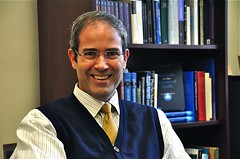As editor of Wonders & Marvels, I have the pleasure of introducing our monthly regular contributors.
On the docket today is Christopher P. Long…
Holly Tucker: We have historians, literary scholars, and novelists among our regular contributors at Wonders & Marvels. Thanks to you, we can now add “philosopher” to the list. Could you tell us a little bit about yourself?
Christopher P. Long: I am an Associate Professor of Philosophy (going up for full this year!) at the Pennsylvania State University where my research focuses on Ancient Greek Philosophy. I have written two books on Aristotle (The Ethics Of Ontology and Aristotle on the Nature of Truth
) and I am currently finishing up a book on Platonic and Socratic Politics. In January 2010, in addition to my faculty responsibilities, I took on more administrative responsibilities as the Associate Dean for Undergraduate Studies in the College of the Liberal Arts at Penn State. As Associate Dean, I have sought to use social media to cultivate a community of education in the College in which the undergraduate experience is celebrated. At the center of that effort is our Liberal Arts Undergraduate Studies blog, which is a curated space for students to write about and reflect on their undergraduate experience at Penn State. Most importantly, though, I am a husband and the father of two amazing little, but very quickly growing, girls.
HT: When we met for the first time at HASTAC, I was really impressed by how you balance serious scholarship with teaching. Much of this teaching happens outside of the classroom through the podcasts you do. What has this contributed to your work?
CpL: In the Summer of 2009, I became a Faculty Fellow at Penn State’s Educational Technology Services during which time I pursued a project called Socratic Politics in Digital Dialogue. The idea was to use social media to enhance my academic scholarship. I have come to think of this as technologically enriched scholarship. During that summer, I created a podcast called The Digital Dialogue in an attempt to cultivate a community of scholarship around my research into the way Socrates practices politics in the Platonic dialogues. I wanted to explore the possibility of pursuing rigorous academic philosophical research and teaching using digital media technologies as opposed to studying the impact of those technologies on my work. I have now produced over 50 episodes of the Digital Dialogue. These conversations with colleagues at Penn State and around the country have enriched in unanticipated ways the book I am in the process of completing.
I learned how to use social media to cultivate a community of learning around specific themes in direct collaboration with students in my teaching. In the classroom, I have tried to develop a cooperative style of education that takes advantage of the affordances technologies offer us to collaborate with our students in ever more public and dynamic ways. I have written about that in an article on Cooperative Education in Teaching Philosophy.
HT: So this is a website about the past, so I always end with this: If you could travel back in time, where would you go? What question do you have about the past that you would try to get answered?
CpL: I would travel back to Athens in 399 BCE, around the time of Socrates’ trial and death. Scholars have long speculated about the political circumstances that led to the trial of Socrates and the decision ultimately to put him to death. My stay there, however, would focus less on the historical details of the trial than on the general mood of the time. In fact, it would be tremendously insightful just to feel what it was like to live there at that time, to talk to people about their prosaic concerns and to experience the quotidian life of an Ancient Greek citizen of Athens. A more detailed sense for the everyday in ancient Athens would add enormous depth to my ongoing philosophical engagement with the ideas that gained currency at that time, and continue to influence us today.
References
- Long, Christopher P. “Cultivating Communities of Learning with Digital Media: Cooperative Education through Blogging and Podcasting,”Teaching Philosophy 33, 4 (2010): 347-361.

